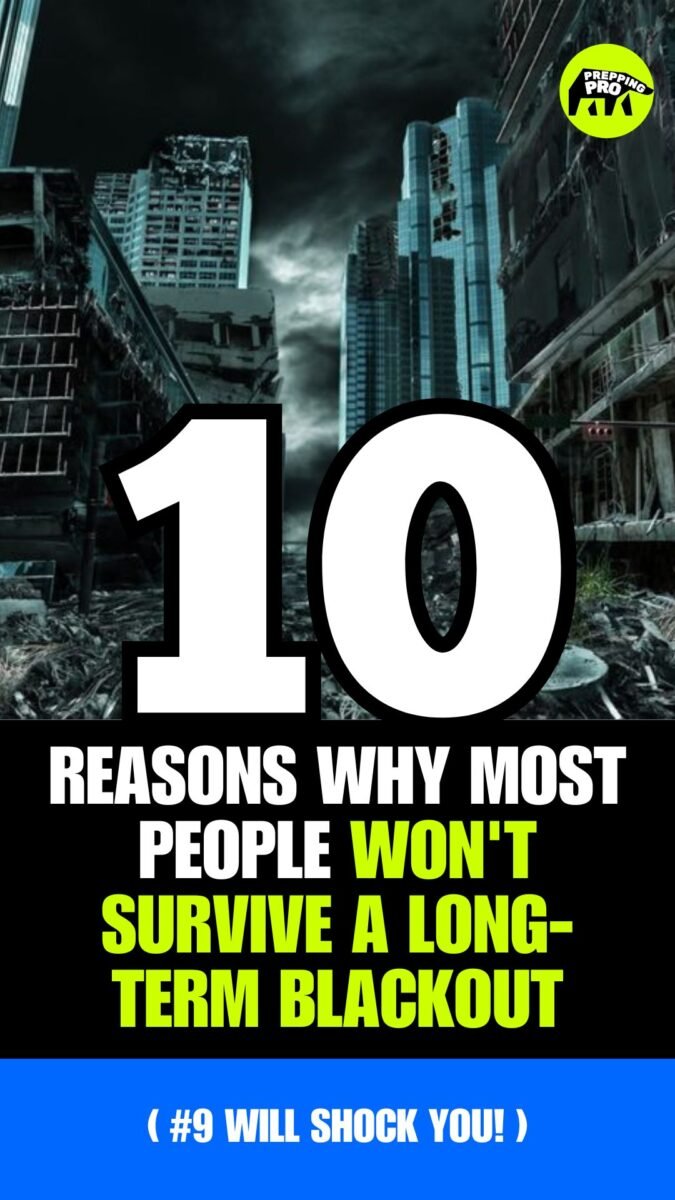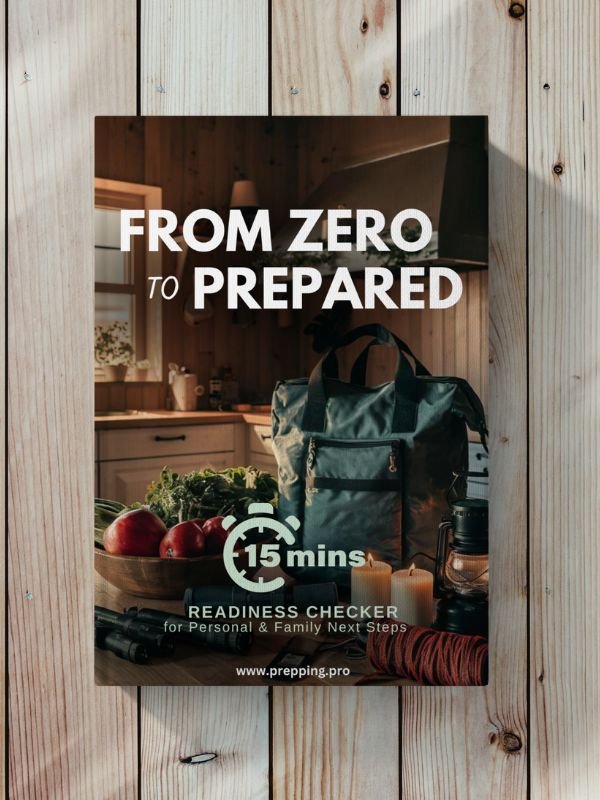In the wake of recent widespread power outage problems, it’s become glaringly apparent that the majority of individuals are ill-prepared to endure a prolonged blackout.
This eye-opening article delves into the top ten reasons why most people won’t survive a long-term blackout, shedding light on the critical preparedness gaps that could cost you your life.
Key Takeaways
- Lack of emergency planning and essential survival skills
- Insufficient food, water, and medical supplies
- Overreliance on technology and failure to embrace self-sufficiency
- Inadequate home security and mental/emotional resilience
By the end of this article, you’ll have a comprehensive understanding of the pitfalls that compromise survival during an extended power outage, empowering you to take proactive steps towards becoming truly prepared for any blackout scenario.
Table of Contents
1. Lack of Emergency Preparedness
Many individuals overlook the importance of emergency preparedness, leaving them ill-equipped to handle a long-term power outage effectively.
This lack of preparation often stems from a belief that such events are unlikely or that help will arrive promptly. However, history has proven that disasters can strike without warning, and self-reliance is crucial during the initial stages of an emergency.
- Failing to plan for extended power outages by stockpiling essential supplies and developing contingency plans.
- Neglecting to assemble a comprehensive emergency kit stocked with necessary items like non-perishable foods, water, first aid supplies, and backup power sources.
- Ignoring the importance of essential survival skills such as fire-starting, water purification, and basic first aid, leaving individuals helpless in the face of adversity.
By neglecting emergency preparedness, individuals increase their vulnerability and decrease their chances of survival during a prolonged blackout scenario. Use our emergency prep checklist generator to ensure you’re fully prepared.
2. Insufficient Food and Water Storage
One of the most critical aspects of long-term blackout planning is ensuring an adequate supply of food and water.
Unfortunately, many people underestimate their daily caloric needs and fail to store enough provisions to sustain themselves for an extended period.
- Underestimating daily caloric needs, particularly during stressful situations or when engaging in physical labor, can lead to rapid depletion of food reserves. Refer to our bulk food purchasing guide for recommendations.
- Neglecting long-term water purification methods, such as filtration systems or water treatment chemicals, can quickly result in water scarcity and potential health risks.
- Relying solely on perishable foods with limited shelf lives, leaving individuals vulnerable to spoilage and potentially severe food shortages. Don’t forget to stock up on emergency food for pets as well.
| Item | Recommended Quantity (per person) |
|---|---|
| Water | 1 gallon per day for drinking and hygiene |
| Non-perishable foods | 2,000-2,500 calories per day |
| Water purification tablets | Sufficient for at least 3 months |
| Emergency water filter | At least one high-quality filter |
Proper food and water storage is essential for survival during a prolonged blackout, ensuring that you have access to the necessary sustenance and hydration. Use our disaster emergency kit checklist to ensure you have everything you need.
3. Poor Blackout Readiness Strategies
Preparing for a long-term blackout requires a comprehensive blackout readiness strategy that addresses various aspects of survival.
Failure to implement effective strategies can severely compromise your ability to endure an extended period without power.
- Lack of alternative power sources, such as generators, solar panels, or backup batteries, leaving you without electricity for critical tasks like lighting, communication, and powering essential devices. Explore solutions to power outages to ensure you have a reliable backup plan.
- Inadequate home insulation and heating options, which can quickly lead to uncomfortable or dangerous living conditions during extreme temperatures.
- Failure to stockpile essential supplies, including fuel for heating and cooking, basic tools and equipment, and emergency lighting sources, leaving you unprepared for the challenges of living without electricity.
Implementing robust blackout readiness strategies should encompass the following:
- Investing in reliable alternative power sources and learning how to operate and maintain them.
- Improving home insulation and exploring alternative heating options like wood stoves or kerosene heaters.
- Stockpiling a diverse range of supplies, including fuel, tools, lighting, and other necessities for off-grid living. Don’t forget to include personal hygiene items as well.
By addressing these critical areas, you’ll be better equipped to sustain yourself and maintain a reasonable quality of life during an extended blackout.
4. Underestimating Blackout Duration
Many individuals fail to survive a long-term blackout due to a fundamental underestimation of the potential duration of the power outage.
This miscalculation can lead to a depletion of resources and a lack of preparedness for an extended period without electricity.
- Unrealistic expectations for power restoration, assuming that utility companies will quickly resolve the issue, can lead to a false sense of security and inadequate preparations.
- Failure to plan for prolonged grid failure, caused by natural disasters, cyber-attacks, or other widespread emergencies, can leave individuals unprepared for scenarios lasting weeks or even months.
- Lack of a long-term survival mindset, which involves adapting to the realities of living without modern conveniences and embracing a self-sufficient lifestyle for an indeterminate period.
To increase your chances of survival, it’s crucial to prepare for the worst-case scenario and assume that the blackout could last for an extended period. This mindset will motivate you to stockpile sufficient supplies, develop robust contingency plans, and cultivate the necessary skills for long-term off-grid living. Consult prepper survival books for valuable insights and guidance.
5. Inadequate Home Security Measures
During a prolonged blackout, the breakdown of social order and potential for civil unrest poses a significant threat to personal safety.
Inadequate home security measures can leave individuals vulnerable to looters, intruders, and opportunistic criminals.
- Vulnerability to looters and intruders due to a lack of robust physical security measures, such as reinforced doors, window coverings, and perimeter defenses.
- Lack of self-defense training and equipment, leaving individuals ill-prepared to protect themselves and their families in the event of a direct threat.
- Poor home fortification strategies, such as failing to secure entry points, establish safe rooms, or implement early warning systems, can compromise your ability to defend your property effectively.
Prioritizing home security should be a critical aspect of your blackout preparedness plan. Invest in appropriate security measures, seek self-defense training, and develop a comprehensive strategy to safeguard your home and loved ones during times of crisis. Don’t forget to include personal protective equipment in your emergency kit.
6. Overreliance on Technology
In our modern, technology-driven society, many individuals have become overly reliant on electrical devices and gadgets.
This dependence can be detrimental during a long-term blackout when these devices become inoperable.
- Dependence on electrical devices and gadgets for communication, entertainment, and information access, leaving individuals disconnected and unprepared for a low-tech lifestyle.
- Lack of low-tech survival skills, such as navigating without GPS, communicating without cell phones, or performing manual tasks without power tools, can severely hinder an individual’s ability to adapt and thrive.
- Unfamiliarity with off-grid living, including basic skills like cooking without electricity, hauling water, and maintaining proper hygiene, can make survival during a blackout an overwhelming challenge.
To increase your chances of survival, it’s essential to develop a diverse set of low-tech skills and cultivate an understanding of off-grid living. Embrace self-sufficiency and reduce your reliance on technology to better prepare for a world without readily available electricity. Consider investing in emergency cooking equipment and learning map and compass skills.
7. Insufficient Medical Preparedness
Maintaining access to adequate medical care can be a significant challenge during a long-term blackout.
Insufficient medical preparedness can have severe consequences, potentially leading to the spread of illness, untreated injuries, and a lack of essential medications.
- Lack of first aid knowledge and supplies, including basic wound care, symptom recognition, and treatment protocols, can leave individuals vulnerable to minor injuries becoming life-threatening conditions. Ensure you have a well-stocked first aid kit.
- Failure to stockpile essential medications, such as prescription drugs, over-the-counter remedies, and medical supplies, can result in a dangerous shortage during an extended blackout.
- Overlooking hygiene and sanitation needs, including access to clean water, proper waste disposal, and personal hygiene products, can contribute to the spread of infectious diseases and overall poor health. Don’t forget insect repellent and sun protection as well.
To mitigate these risks, it’s crucial to prioritize medical preparedness in your blackout planning:
- Acquire comprehensive first aid training and maintain a well-stocked first aid kit.
- Consult with healthcare professionals to ensure an adequate supply of essential medications and medical supplies.
- Develop a plan for maintaining proper hygiene and sanitation, including alternative methods for waste disposal and water purification. A portable toilet may be a useful addition.
By addressing these critical medical needs, you can increase your chances of staying healthy and minimizing the risk of illness or injury during a prolonged blackout.
8. Poor Communication and Navigation Skills
Effective communication and navigation are essential during a long-term blackout, as traditional methods may be disrupted or unavailable.
Failure to plan for these challenges can leave individuals isolated, disoriented, and unable to access critical information or resources.
- Inability to receive emergency updates due to a lack of alternative communication methods, such as battery-powered radios or satellite phones, can leave individuals unaware of important developments or instructions. Explore emergency communication tools to stay connected.
- Lack of maps and navigational tools, including paper maps, compasses, and GPS devices with backup batteries, can hinder your ability to navigate safely and efficiently during a blackout.
- Failure to establish communication plans with family members, neighbors, or community groups can lead to confusion, missed opportunities for assistance, and a general lack of coordination during an emergency. Refer to our family emergency communication plan example for guidance.
To ensure effective communication and navigation during a blackout, consider the following:
- Invest in alternative communication methods, such as hand-crank or solar-powered radios, and learn how to access emergency broadcast channels.
- Obtain paper maps of your local area, as well as navigational tools like compasses and GPS devices with backup batteries.
- Establish clear communication plans with loved ones, neighbors, and community groups, including designated meeting points and emergency protocols.
By addressing these critical areas, you’ll be better equipped to stay informed, navigate safely, and coordinate with others during a prolonged blackout scenario.
9. Mental and Emotional Unpreparedness
Surviving a long-term blackout is not just a physical challenge; it also requires significant mental and emotional resilience.
Mental and emotional unpreparedness can be a significant barrier to survival, as the psychological toll of a prolonged crisis can be overwhelming.
- Underestimating the psychological toll of living in a state of uncertainty, deprivation, and potential danger can lead to anxiety, depression, and a decreased ability to cope effectively.
- Lack of stress management techniques, such as mindfulness practices, journaling, or relaxation exercises, can exacerbate the mental strain and make it challenging to maintain a clear and focused mindset.
- Failure to foster a resilient mindset, which involves cultivating adaptability, perseverance, and a positive attitude, can undermine your ability to overcome obstacles and maintain hope during difficult times.
To bolster your mental and emotional preparedness, consider the following strategies:
- Educate yourself on the potential psychological impact of a long-term blackout and develop coping mechanisms to manage stress and anxiety.
- Practice stress management techniques, such as deep breathing exercises, meditation, or engaging in hobbies that provide a sense of calm and focus.
- Cultivate a resilient mindset by embracing challenges as opportunities for growth, focusing on what you can control, and maintaining a positive and proactive attitude.
- Foster a strong support system, whether through family, friends, or community groups, to provide emotional support and a sense of collective resilience.
By prioritizing your mental and emotional well-being, you’ll be better equipped to navigate the challenges of a prolonged blackout with a clear and resilient mindset.
10. Ignoring the Importance of Community
During a long-term blackout, the ability to work together and share resources can be crucial for survival.
Ignoring the importance of community and fostering relationships with others can leave individuals isolated and vulnerable.
- Isolation and lack of support networks can exacerbate the physical and emotional challenges of a blackout, leaving individuals without access to essential resources or assistance.
- Failure to establish mutual aid agreements with neighbors, community groups, or local organizations can result in missed opportunities for collaboration and resource-sharing.
- Overlooking the value of teamwork and resource sharing can lead to unnecessary duplication of efforts, resource depletion, and a general lack of support during a crisis.
To leverage the power of community and increase your chances of survival, consider the following:
- Actively engage with your local community and build strong relationships with neighbors, community organizations, and local authorities.
- Explore the possibility of establishing mutual aid agreements, where resources and skills are shared for the collective benefit of the group.
- Foster a spirit of collaboration and teamwork, recognizing that working together can multiply your capabilities and increase your chances of overcoming challenges.
By embracing the importance of community and fostering strong relationships, you’ll be better positioned to access essential resources, receive support, and leverage the collective strength of a unified group during a prolonged blackout scenario.
Consider adding a blackout box to your emergency kit to facilitate communication and coordination with your community.


